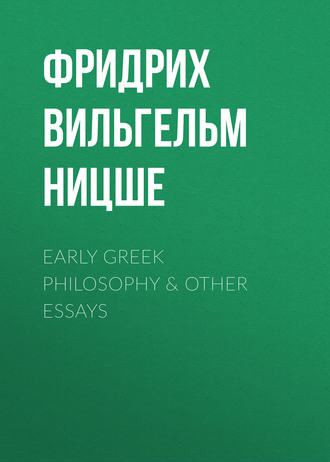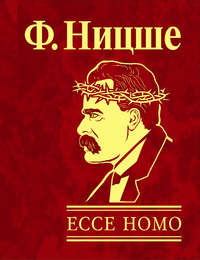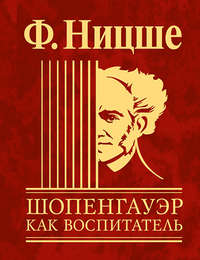 полная версия
полная версияEarly Greek Philosophy & Other Essays
Let us now look around for the highest authority as to what constitutes the health of a nation. I he Greeks, as the truly healthy nation, have justified philosophy once for all by having philosophised; and that indeed more than all other nations. They could not even stop at the right time, for still in their withered age they comported themselves as heated notaries of philosophy, although they understood by it only the pious sophistries and the sacrosanct hair-splittings of Christian dogmatics. They themselves have much lessened their merit for barbarian posterity by not being able to stop at the right time, because that posterity in its uninstructed and impetuous youth necessarily became entangled in those artfully woven nets and ropes.
On the contrary, the Greek knew how to begin at the right time, and this lesson, when one ought to begin philosophising, they teach more distinctly than any other nation. For it should not be begun when trouble comes as perhaps some presume who derive philosophy from moroseness; no, but in good fortune, in mature manhood, out of the midst of the fervent serenity of a brave and victorious man's estate. The fact that the Greeks philosophised at that time throws light on the nature of philosophy and her task as well as on the nature of the Greeks themselves. Had they at that time been such commonsense and precocious experts and gayards as the learned Philistine of our days perhaps imagines, or had their life been only a state of voluptuous soaring, chiming, breathing and feeling, as the unlearned visionary is pleased to assume, then the spring of philosophy would not have come to light among them. At the best there would have come forth a brook soon trickling away in the sand or evaporating into fogs, but never that broad river flowing forth with the proud beat of its waves, the river which we know as Greek Philosophy.
True, it has been eagerly pointed out how much the Greeks could find and learn abroad, in the Orient, and how many different things they may easily have brought from there. Of course an odd spectacle resulted, when certain scholars brought together the alleged masters from the Orient and the possible disciples from Greece, and exhibited Zarathustra near Heraclitus, the Hindoos near the Eleates, the Egyptians near Empedocles, or even Anaxagoras among the Jews and Pythagoras among the Chinese. In detail little has been determined; but we should in no way object to the general idea, if people did not burden us with the conclusion that therefore Philosophy had only been imported into Greece and was not indigenous to the soil, yea, that she, as something foreign, had possibly ruined rather than improved the Greek. Nothing is more foolish than to swear by the fact that the Greeks had an aboriginal culture; no, they rather absorbed all the culture flourishing among other nations, and they advanced so far, just because they understood how to hurl the spear further from the very spot where another nation had let it rest. They were admirable in the art of learning productively, and so, like them, we ought to learn from our neighbours, with a view to Life not to pedantic knowledge, using everything learnt as a foothold whence to leap high and still higher than our neighbour. The questions as to the beginning of philosophy are quite negligible, for everywhere in the beginning there is the crude, the unformed, the empty and the ugly; and in all things only the higher stages come into consideration. He who in the place of Greek philosophy prefers to concern himself with that of Egypt and Persia, because the latter are perhaps more "original" and certainly older, proceeds just as ill-advisedly as those who cannot be at ease before they have traced back the Greek mythology, so grand and profound, to such physical trivialities as sun, lightning, weather and fog, as its prime origins, and who fondly imagine they have rediscovered for instance in the restricted worship of the one celestial vault among the other Indo-Germans a purer form of religion than the poly-theistic worship of the Greek had been. The road towards the beginning always leads into barbarism, and he who is concerned with the Greeks ought always to keep in mind the fact that the unsubdued thirst for knowledge in itself always barbarises just as much as the hatred of knowledge, and that the Greeks have subdued their inherently insatiable thirst for knowledge by their regard for Life, by an ideal need of Life, – since they wished to live immediately that which they learnt. The Greeks also philosophised as men of culture and with the aims of culture, and therefore saved themselves the trouble of inventing once again the elements of philosophy and knowledge out of some autochthonous conceit, and with a will they at once set themselves to fill out, enhance, raise and purify these elements they had taken over in such a way, that only now in a higher sense and in a purer sphere they became inventors. For they discovered the typical philosopher's genius, and the inventions of all posterity have added nothing essential.
Every nation is put to shame if one points out such a wonderfully idealised company of philosophers as that of the early Greek masters, Thales, Anaximander, Heraclitus, Parmenides, Anaxagoras, Empedocles, Democritus and Socrates. All those men are integral, entire and self-contained,3 and hewn out of one stone. Severe necessity exists between their thinking and their character. They are not bound by any convention, because at that time no professional class of philosophers and scholars existed. They all stand before us in magnificent solitude as the only ones who then devoted their life exclusively to knowledge. They all possess the virtuous energy of the Ancients, whereby they excel all the later philosophers in finding their own form and in perfecting it by metamorphosis in its most minute details and general aspect. For they were met by no helpful and facilitating fashion. Thus together they form what Schopenhauer, in opposition to the Republic of Scholars, has called a Republic of Geniuses; one giant calls to another across the arid intervals of ages, and, undisturbed by a wanton, noisy race of dwarfs, creeping about beneath them, the sublime intercourse of spirits continues.
Of this sublime intercourse of spirits I have resolved to relate those items which our modern hardness of hearing might perhaps hear and understand; that means certainly the least of all. It seems to me that those old sages from Thales to Socrates have discussed in that intercourse, although in its most general aspect, everything that constitutes for our contemplation the peculiarly Hellenic. In their intercourse, as already in their personalities, they express distinctly the great features of Greek genius of which the whole of Greek history is a shadowy impression, a hazy copy, which consequently speaks less clearly. If we could rightly interpret the total life of the Greek nation, we should ever find reflected only that picture which in her highest geniuses shines with more resplendent colours. Even the first experience of philosophy on Greek soil, the sanction of the Seven Sages is a distinct and unforgettable line in the picture of the Hellenic. Other nations have their Saints, the Greeks have Sages. Rightly it has been said that a nation is characterised not only by her great men but rather by the manner in which she recognises and honours them. In other ages the philosopher is an accidental solitary wanderer in the most hostile environment, either slinking through or pushing himself through with clenched fists. With the Greek however the philosopher is not accidental; when in the Sixth and Fifth centuries amidst the most frightful dangers and seductions of secularisation he appears and as it were steps forth from the cave of Trophonios into the very midst of luxuriance, the discoverers' happiness, the wealth and the sensuousness of the Greek colonies, then we divine that he comes as a noble warner for the same purpose for which in those centuries Tragedy was born and which the Orphic mysteries in their grotesque hieroglyphics give us to understand. The opinion of those philosophers on Life and Existence altogether means so much more than a modern opinion because they had before themselves Life in a luxuriant perfection, and because with them, unlike us, the sense of the thinker was not muddled by the disunion engendered by the wish for freedom, beauty, fulness of life and the love for truth that only asks: What is the good of Life at all? The mission which the philosopher has to discharge within a real Culture, fashioned in a homogeneous style, cannot be clearly conjectured out of our circumstances and experiences for the simple reason that we have no such culture. No, it is only a Culture like the Greek which can answer the question as to that task of the philosopher, only such a Culture can, as I said before, justify philosophy at all; because such a Culture alone knows and can demonstrate why and how the philosopher is not an accidental, chance wanderer driven now hither, now thither. There is a steely necessity which fetters the philosopher to a true Culture: but what if this Culture does not exist? Then the philosopher is an incalculable and therefore terror-inspiring comet, whereas in the favourable case, he shines as the central star in the solar-system of culture. It is for this reason that the Greeks justify the philosopher, because with them he is no comet.
2
After such contemplations it will be accepted without offence if I speak of the pre-Platonic philosophers as of a homogeneous company, and devote this paper to them exclusively. Something quite new begins with Plato; or it might be said with equal justice that in comparison with that Republic of Geniuses from Thales to Socrates, the philosophers since Plato lack something essential.
Whoever wants to express himself unfavourably about those older masters may call them one-sided, and their Epigones, with Plato as head, many-sided. Yet it would be more just and unbiassed to conceive of the latter as philosophic hybrid-characters, of the former as the pure types. Plato himself is the first magnificent hybrid-character, and as such finds expression as well in his philosophy as in his personality. In his ideology are united Socratian, Pythagorean, and Heraclitean elements, and for this reason it is no typically pure phenomenon. As man, too, Plato mingles the features of the royally secluded, all-sufficing Heraclitus, of the melancholy-compassionate and legislatory Pythagoras and of the psycho-expert dialectician Socrates. All later philosophers are such hybrid-characters; wherever something one-sided does come into prominence with them as in the case of the Cynics, it is not type but caricature. Much more important however is the fact that they are founders of sects and that the sects founded by them are all institutions in direct opposition to the Hellenic culture and the unity of its style prevailing up to that time. In their way they seek a redemption, but only for the individuals or at the best for groups of friends and disciples closely connected with them. The activity of the older philosophers tends, although they were unconscious of it, towards a cure and purification on a large scale; the mighty course of Greek culture is not to be stopped; awful dangers are to be removed out of the way of its current; the philosopher protects and defends his native country. Now, since Plato, he is in exile and conspires against his fatherland.
It is a real misfortune that so very little of those older philosophic masters has come down to us and that all complete works of theirs are withheld from us. Involuntarily, on account of that loss, we measure them according to wrong standards and allow ourselves to be influenced unfavourably towards them by the mere accidental fact that Plato and Aristotle never lacked appreciators and copyists. Some people presuppose a special providence for books, a fatum libellorum; such a providence however would at any rate be a very malicious one if it deemed it wise to withhold from us the works of Heraclitus, Empedocles' wonderful poem, and the writings of Democritus, whom the ancients put on a par with Plato, whom he even excels as far as ingenuity goes, and as a substitute put into our hand Stoics, Epicureans and Cicero. Probably the most sublime part of Greek thought and its expression in words is lost to us; a fate which will not surprise the man who remembers the misfortunes of Scotus Erigena or of Pascal, and who considers that even in this enlightened century the first edition of Schopenhauer's "The World As Will And Idea" became waste-paper. If somebody will presuppose a special fatalistic power with respect to such things he may do so and say with Goethe: "Let no one complain about and grumble at things vile and mean, they are the real rulers, – however much this be gainsaid!" In particular they are more powerful than the power of truth. Mankind very rarely produces a good book in which with daring freedom is intonated the battle-song of truth, the song of philosophic heroism; and yet whether it is to live a century longer or to crumble and moulder into dust and ashes, depends on the most miserable accidents, on the sudden mental eclipse of men's heads, on superstitious convulsions and antipathies, finally on fingers not too fond of writing or even on eroding bookworms and rainy weather. But we will not lament but rather take the advice of the reproving and consolatory words which Hamann addresses to scholars who lament over lost works. "Would not the artist who succeeded in throwing a lentil through the eye of a needle have sufficient, with a bushel of lentils, to practise his acquired skill? One would like to put this question to all scholars who do not know how to use the works of the Ancients any better than that man used his lentils." It might be added in our case that not one more word, anecdote, or date needed to be transmitted to us than has been transmitted, indeed that even much less might have been preserved for us and yet we should have been able to establish the general doctrine that the Greeks justify philosophy.
A time which suffers from the so-called "general education" but has no culture and no unity of style in her life hardly knows what to do with philosophy, even if the latter were proclaimed by the very Genius of Truth in the streets and market-places. She rather remains at such a time the learned monologue of the solitary rambler, the accidental booty of the individual, the hidden closet-secret or the innocuous chatter between academic senility and childhood. Nobody dare venture to fulfil in himself the law of philosophy, nobody lives philosophically, with that simple manly faith which compelled an Ancient, wherever he was, whatever he did, to deport himself as a Stoic, when he had once pledged his faith to the Stoa. All modern philosophising is limited politically and regulated by the police to learned semblance. Thanks to governments, churches, academies, customs, fashions, and the cowardice of man, it never gets beyond the sigh: "If only!.." or beyond the knowledge: "Once upon a time there was…" Philosophy is without rights; therefore modern man, if he were at all courageous and conscientious, ought to condemn her and perhaps banish her with words similar to those by which Plato banished the tragic poets from his State. Of course there would be left a reply for her, as there remained to those poets against Plato. If one once compelled her to speak out she might say perhaps: "Miserable Nation! Is it my fault if among you I am on the tramp, like a fortune teller through the land, and must hide and disguise myself, as if I were a great sinner and ye my judges? Just look at my sister, Art! It is with her as with me; we have been cast adrift among the Barbarians and no longer know how to save ourselves. Here we are lacking, it is true, every good right; but the judges before whom we find justice judge you also and will tell you: First acquire a culture; then you shall experience what Philosophy can and will do." —
3
Greek philosophy seems to begin with a preposterous fancy, with the proposition that water is the origin and mother-womb of all things. Is it really necessary to stop there and become serious? Yes, and for three reasons: Firstly, because the proposition does enunciate something about the origin of things; secondly, because it does so without figure and fable; thirdly and lastly, because in it is contained, although only in the chrysalis state, the idea: Everything is one. The first mentioned reason leaves Thales still in the company of religious and superstitious people, the second however takes him out of this company and shows him to us as a natural philosopher, but by virtue of the third, Thales becomes the first Greek philosopher. If he had said: "Out of water earth is evolved," we should only have a scientific hypothesis; a false one, though nevertheless difficult to refute. But he went beyond the scientific. In his presentation of this concept of unity through the hypothesis of water, Thales has not surmounted the low level of the physical discernments of his time, but at the best overleapt them. The deficient and unorganised observations of an empiric nature which Thales had made as to the occurrence and transformations of water, or to be more exact, of the Moist, would not in the least have made possible or even suggested such an immense generalisation. That which drove him to this generalisation was a metaphysical dogma, which had its origin in a mystic intuition and which together with the ever renewed endeavours to express it better, we find in all philosophies, – the proposition: Everything is one!
How despotically such a faith deals with all empiricism is worthy of note; with Thales especially one can learn how Philosophy has behaved at all times, when she wanted to get beyond the hedges of experience to her magically attracting goal. On light supports she leaps in advance; hope and divination wing her feet. Calculating reason too, clumsily pants after her and seeks better supports in its attempt to reach that alluring goal, at which its divine companion has already arrived. One sees in imagination two wanderers by a wild forest-stream which carries with it rolling stones; the one, light-footed, leaps over it using the stones and swinging himself upon them ever further and further, though they precipitously sink into the depths behind him. The other stands helpless there most of the time; he has first to build a pathway which will bear his heavy, weary step; sometimes that cannot be done and then no god will help him across the stream. What therefore carries philosophical thinking so quickly to its goal? Does it distinguish itself from calculating and measuring thought only by its more rapid flight through large spaces? No, for a strange illogical power wings the foot of philosophical thinking; and this power is Fancy. Lifted by the latter, philosophical thinking leaps from possibility to possibility, and these for the time being are taken as certainties; and now and then even whilst on the wing it gets hold of certainties. An ingenious presentiment shows them to the flier; demonstrable certainties are divined at a distance to be at this point. Especially powerful is the strength of Fancy in the lightning-like seizing and illuminating of similarities; afterwards reflection applies its standards and models and seeks to substitute the similarities by equalities, that which was seen side by side by causalities. But though this should never be possible, even in the case of Thales the indemonstrable philosophising has yet its value; although all supports are broken when Logic and the rigidity of Empiricism want to get across to the proposition: Everything is water; yet still there is always, after the demolition of the scientific edifice, a remainder, and in this very remainder lies a moving force and as it were the hope of future fertility.
Of course I do not mean that the thought in any restriction or attenuation, or as allegory, still retains some kind of "truth"; as if, for instance, one might imagine the creating artist standing near a waterfall, and seeing in the forms which leap towards him, an artistically prefiguring game of the water with human and animal bodies, masks, plants, rocks, nymphs, griffins, and with all existing types in general, so that to him the proposition: Everything is water, is confirmed. The thought of Thales has rather its value – even after the perception of its indemonstrableness – in the very fact, that it was meant unmythically and unallegorically. The Greeks among whom Thales became so suddenly conspicuous were the anti-type of all realists by only believing essentially in the reality of men and gods, and by contemplating the whole of nature as if it were only a disguise, masquerade and metamorphosis of these god-men. Man was to them the truth, and essence of things; everything else mere phenomenon and deceiving play. For that very reason they experienced incredible difficulty in conceiving of ideas as ideas. Whilst with the moderns the most personal item sublimates itself into abstractions, with them the most abstract notions became personified. Thales, however, said, "Not man but water is the reality of things "; he began to believe in nature, in so far that he at least believed in water. As a mathematician and astronomer he had grown cold towards everything mythical and allegorical, and even if he did not succeed in becoming disillusioned as to the pure abstraction, Everything is one, and although he left off at a physical expression he was nevertheless among the Greeks of his time a surprising rarity. Perhaps the exceedingly conspicuous Orpheans possessed in a still higher degree than he the faculty of conceiving abstractions and of thinking unplastically; only they did not succeed in expressing these abstractions except in the form of the allegory. Also Pherecydes of Syrus who is a contemporary of Thales and akin to him in many physical conceptions hovers with the expression of the latter in that middle region where Allegory is wedded to Mythos, so that he dares, for example, to compare the earth with a winged oak, which hangs in the air with spread pinions and which Zeus bedecks, after the defeat of Kronos, with a magnificent robe of honour, into which with his own hands Zeus embroiders lands, water and rivers. In contrast with such gloomy allegorical philosophising scarcely to be translated into the realm of the comprehensible, Thales' are the works of a creative master who began to look into Nature's depths without fantastic fabling. If as it is true he used Science and the demonstrable but soon out-leapt them, then this likewise is a typical characteristic of the philosophical genius. The Greek word which designates the Sage belongs etymologically to sapio, I taste, sapiens, the tasting one, sisyphos, the man of the most delicate taste; the peculiar art of the philosopher therefore consists, according to the opinion of the people, in a delicate selective judgment by taste, by discernment, by significant differentiation. He is not prudent, if one calls him prudent, who in his own affairs finds out the good; Aristotle rightly says: "That which Thales and Anaxagoras know, people will call unusual, astounding, difficult, divine but – useless, since human possessions were of no concern to those two." Through thus selecting and precipitating the unusual, astounding, difficult, and divine, Philosophy marks the boundary-lines dividing her from Science in the same way as she does it from Prudence by the emphasising of the useless. Science without thus selecting, without such delicate taste, pounces upon everything knowable, in the blind covetousness to know all at any price; philosophical thinking however is always on the track of the things worth knowing, on the track of the great and most important discernments. Now the idea of greatness is changeable, as well in the moral as in the æsthetic realm, thus Philosophy begins with a legislation with respect to greatness, she becomes a Nomenclator. "That is great," she says, and therewith she raises man above the blind, untamed covetousness of his thirst for knowledge. By the idea of greatness she assuages this thirst: and it is chiefly by this, that she contemplates the greatest discernment, that of the essence and kernel of things, as attainable and attained. When Thales says, "Everything is water," man is startled up out of his worm-like mauling of and crawling about among the individual sciences; he divines the last solution of things and masters through this divination the common perplexity of the lower grades of knowledge. The philosopher tries to make the total-chord of the universe re-echo within himself and then to project it into ideas outside himself: whilst he is contemplative like the creating artist, sympathetic like the religionist, looking out for ends and causalities like the scientific man, whilst he feels himself swell up to the macrocosm, he still retains the circumspection to contemplate himself coldly as the reflex of the world; he retains that cool-headedness, which the dramatic artist possesses, when he transforms himself into other bodies, speaks out of them, and yet knows how to project this transformation outside himself into written verses. What the verse is to the poet, dialectic thinking is to the philosopher; he snatches at it in order to hold fast his enchantment, in order to petrify it. And just as words and verse to the dramatist are only stammerings in a foreign language, to tell in it what he lived, what he saw, and what he can directly promulgate by gesture and music only, thus the expression of every deep philosophical intuition by means of dialectics and scientific reflection is, it is true, on the one hand the only means to communicate what has been seen, but on the other hand it is a paltry means, and at the bottom a metaphorical, absolutely inexact translation into a different sphere and language. Thus Thales saw the Unity of the "Existent," and when he wanted to communicate this idea he talked of water.











